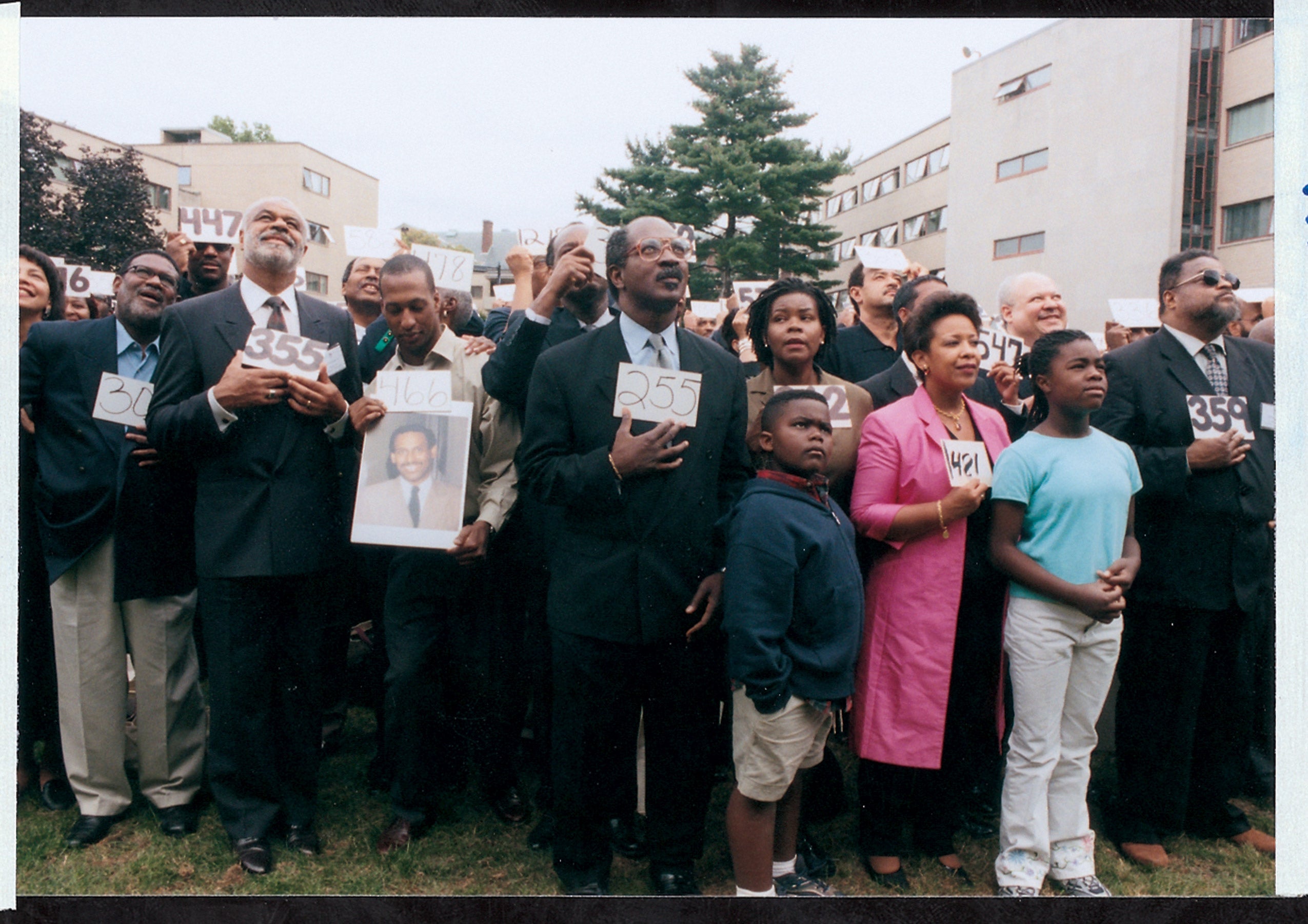When Reggie Hedgebeth ’96 heard that the School was to hold A Celebration of Black Alumni, he thought, “It’s time.”
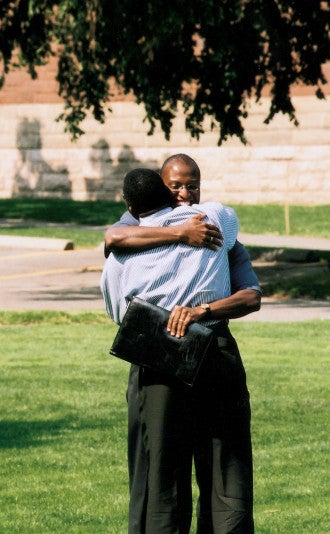
Marvin Artis ’89 and Michael Sudarkasa ’88
For the approximately 600 alumni who joined him at HLS from September 22 to 24, it was time. Time to reflect on the long history of African American accomplishment at HLS and pay tribute to those who fought against a “separate but equal” education. Time to reconnect with a School that recognizes and honors them as an important part of its community, now and in the future. All the while saving a bit of time to socialize, to network, to just have fun. “If this is a first step,” said Hedgebeth, “it’s going to be a great first step.”
And, as Harvard University President Neil Rudenstine noted, “It could never have taken place until now.” The Law School, he said, through its commitment to recruit black students, has achieved the quality and quantity of black alumni—1,681, more than two-thirds of whom graduated in the ’80s and ’90s—to make the Celebration vital and historic. “I find myself saying, ‘Wow, look what Harvard has done,’” said Dean Robert Clark ’72. “It clinches the argument for diversity when you see it in the flesh.”
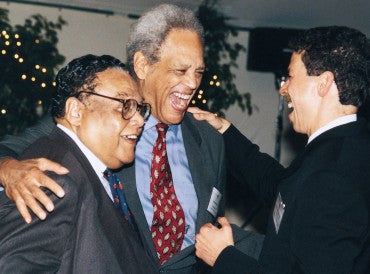
William Coleman, Jr. ’43 (’46), Roger Wilkins, and Professor David Wilkins ’80
The Law School invited all 1,400 living black alumni, along with 200 other alumni leaders, to the Celebration, which featured panel discussions, alumni interaction with current students, a presentation on the history of black students at HLS, and a photograph of all Celebration participants. Kenneth Chenault ’76 (’77), CEO designate of American Express, accepted the Harvard Law School Association Award and delivered the keynote address. In addition, members of the Brown v. Board of Education litigation team received the first Harvard Law School Medal of Freedom.
Professor David Wilkins ’80, who organized the event, the first of its kind at HLS, said that the Celebration allowed black alumni to reconcile themselves to a School that has been “a very important yet sometimes painful part of their lives.
“People understand that African Americans are an integral part of this institution and we have an important role to play in Harvard’s future,” said Wilkins. “This is really a historic moment in the history of the School.”
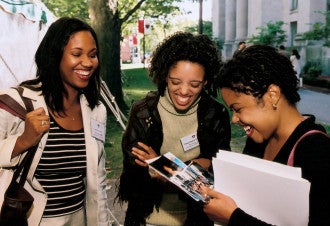
1999 classmates Kami Chavis, Tiffany Bingham-Shango, and Arianne Callender
“It’s such a heartrending moment because these are my classmates, former students, my friends, and my institution,” he said. “To see this School and all its faculty and all its administration coming out to honor its legacy of graduating African American students is one of the most exciting things I’ve ever experienced.”
Wilkins noted the breadth of accomplished alumni who returned to the School. They include U.S. Court of Appeals Judge Judith Rogers ’64; Washington, D.C. Mayor Anthony Williams ’87; Debra Lee ’80, president and chief operating officer of BET Holdings, Inc.; Deborah Wright ’84, president and CEO of Carver Bankcorp, Inc.; Patricia King ’69, professor at Georgetown University Law Center; William Coleman, Jr. ’43 (’46), former secretary of the U.S. Department of Transportation; Ted Wells ’76, cochairman of the litigation department at Paul, Weiss, Rifkind, Wharton & Garrison; and Stephanie Bell-Rose ’83 (’84), president of the Goldman Sachs Foundation.
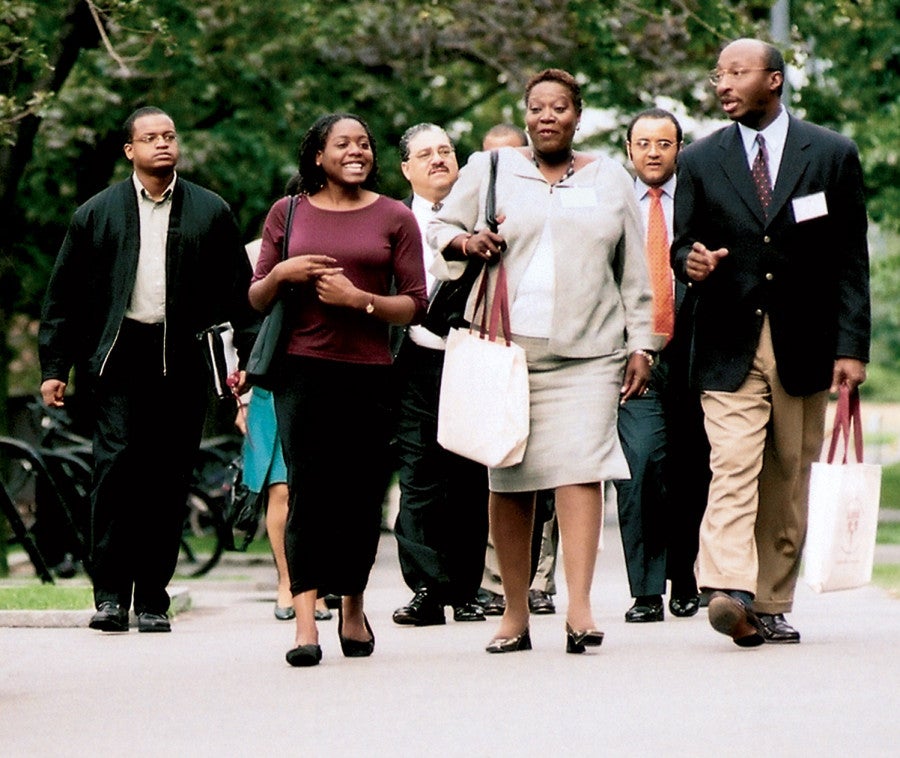
Celebration participants head to Sanders Theatre for the morning plenary session.
“Harvard’s African American alumni have gone on to become leaders in every field of human endeavor,” Wilkins observed in his luncheon talk. “Among their ranks are prominent lawyers, high-ranking public servants, successful entrepreneurs, and award-winning artists. In an age in which some people are asking the question, ‘What has been the value of diversity and inclusion in our top institutions of higher learning?’ when you look around this room and you see the incredible accomplishments of those people who have come to Harvard Law School, I think it answers that question.
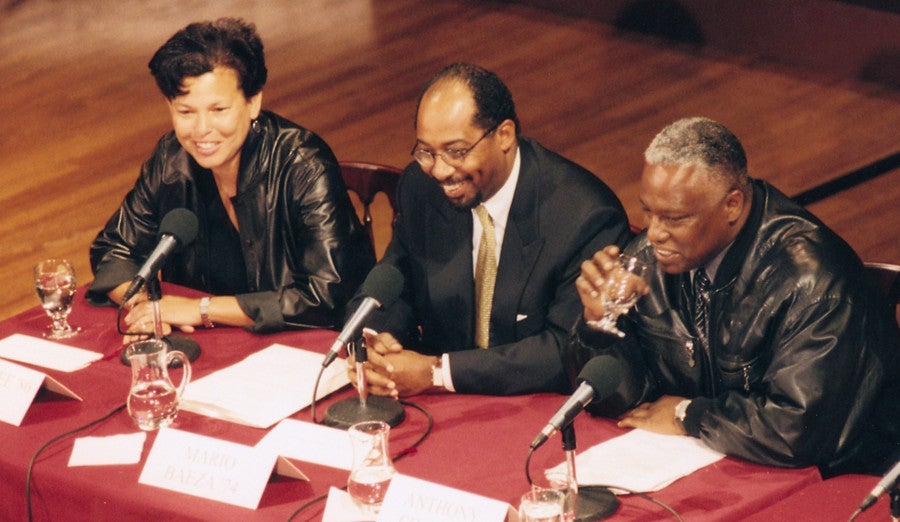
In panel discussions throughout the weekend, participants considered an array of topics, including the role that black HLS graduates can play in solving the problems of the black community, models of leadership across generations, the emerging generation of black CEOs, and the changing course of careers in areas ranging from public service, to the new economy, to “life after law.” During the opening plenary session, panelists discussed the power of black graduates to effect change, even as many work in corporate America. “What I see as the issue is when we start to define certain choices as somehow antithetical to African American people,” said David Thomas, a professor of business administration at Harvard Business School who has studied the careers of minority executives. “People should pursue their interests but take responsibility for the privilege they have in doing that.”
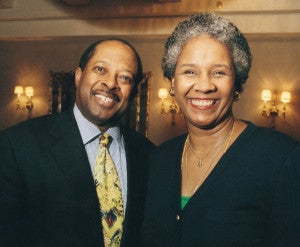
Tynia Richard ’90, who attended the panel, said that black graduates can play an important role in social change regardless of the type of law they practice. A specialty like mergers and acquisitions still affects black people, she said. “Even if you’re not willing to do the civil rights work, you can reach out and mentor someone in your firm,” she added.
In a panel on leadership moderated by Professor Lani Guinier, Bryan Stevenson ’85, executive director of Equal Justice Initiative of Alabama, outlined the struggles and satisfaction of his job. “It can be debilitating to always be the troublemaker,” Stevenson said, yet “it’s better to be about something and get nothing for it than to be about nothing and get something for it.”
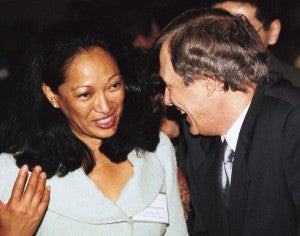
Other panelists echoed this sentiment. Barack Obama ’91, a state senator in Illinois, said that students should understand the wide range of leadership opportunities awaiting them after graduation. “What strikes me is how many talented young students come out of law school thinking they have no options,” he said.
Earl Phalen ’93 (’94), founder and CEO of the B.E.L.L. Foundation, which provides after-school and enrichment programs to minority children, challenged the audience to use their education for the good of disenfranchised and disadvantaged people. “The purpose of education is liberation, and I wonder how many of us are liberated based on the opportunities we’ve had here,” said Phalen. “I would encourage us to use our tremendous power to make a difference.”
Chenault continued the leadership theme in his keynote address. He praised four distinguished African American alumni: Charles Hamilton Houston ’22 S.J.D. ’23, William Henry Hastie ’30 S.J.D. ’33, William Coleman, Jr. ’43 (’46), and Reginald Lewis ’68. Chenault urged alumni to build on this legacy when confronting the challenges of the 21st century. “As leaders of our generation, we—both alumni and students—are accountable to those who have come before us to continue the legacy of Harvard Law School,” said Chenault. “Anyone can be a leader no matter what their background . . . but as Harvard Law School graduates, we have a particularly strong platform to exercise leadership. We’ve been presented with a great opportunity, and it’s our responsibility to fulfill it.”
In a CEO roundtable moderated by Professor Charles Ogletree, Jr. ’78, African American executives said that building competitive businesses helps open doors of opportunity for those too often left behind by economic progress. Debra Lee ’80 of BET Holdings and Anthony Chase ’80 of ChaseCom Limited Partnerships both spoke of their efforts to ensure that African Americans join the new information economy. Deborah Wright ’84 and Mario Baeza ’74 emphasized the importance of black participation in the capital markets, both locally through community banking institutions such as Wright’s Carver Bankcorp and globally through private equity funds such as Baeza’s TCW/Latin American Partners.
Although attendees expressed pride and satisfaction in the progress that has been made by black professionals during the last 30 years, many also lamented the burdens that they have carried—and too often continue to carry—because of their race. Some recalled painful memories from their own law school experience such as the unofficial “black days” in the late 1960s (similar to the “ladies days” a decade before), in which certain professors would call on only black students in an attempt to humiliate them. More recent graduates cited the struggles to add black faculty members. Others echoed Baeza’s frustration that continuing barriers make it difficult to “let your guard down” as a black professional. These memories made many reluctant to return to HLS. Some came to the Celebration after personal phone calls from Wilkins and others convincing them to return to the School, many for the first time since they graduated. “I never thought I’d be back,” said Deborah Peterson Small ’87. “This is the only event that would have gotten me back here.
Now that they have returned, many black alumni said that the Celebration should be a beginning, not an end, to their engagement with the School and with one another. Many spoke of the importance of creating a functioning black alumni network while becoming more involved with the Harvard Law School Association.
In one moment that encapsulated the event, participants lingered in Jarvis Field after the group photo, swapping tales, posing for impromptu class pictures, coming together in ways few had imagined. Even Wilkins, who made it possible, marveled at the intensity of feelings throughout the Celebration. But the challenge now, he said, is to build ways to keep the connection strong.
The black alumni, said Wilkins, left the event “wanting very much to look to the future, to use the incredible talent in the room to make progress on today’s issues that confront the black community, Harvard, and the world.”
